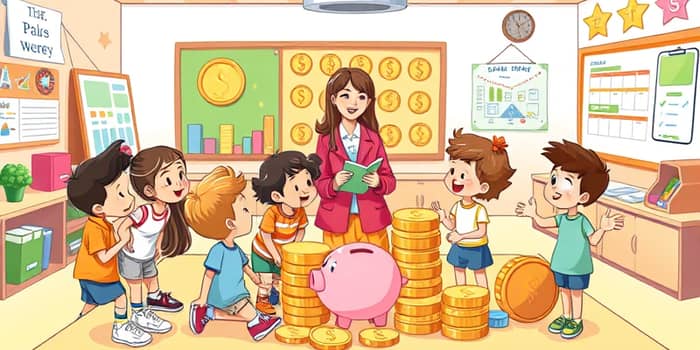Financial literacy equips individuals with the knowledge and skills necessary to navigate complex money matters throughout life. By introducing fundamental concepts such as budgeting, saving, and responsible spending at a young age, children develop confidence and competence in managing resources. These early lessons lay the foundation for lifelong money habits that can significantly improve personal and familial economic stability down the road.
Why Early Financial Literacy Matters
Understanding money management in early childhood fosters critical thinking and decision-making abilities. When young learners grasp basic financial principles, they can weigh choices more effectively, such as distinguishing between wants and needs. This early empowerment not only enhances academic performance but also cultivates a mindset of accountability and planning that resonates throughout adolescence and adulthood.
The formation of responsible money behaviors reduces the risk of debt accumulation, promotes saving, and encourages strategic investing. Research underscores how these substantial long-term benefits translate into higher credit scores, greater emergency preparedness, and a stronger buffer against economic shocks later in life.
Current Gaps and Public Sentiment
Despite overwhelming consensus about its importance, financial education remains siloed or absent in many school systems. In the United States, only half of adults demonstrate proficiency in key finance topics, and just 23 states require a financial literacy course for high school graduation. Surveys reveal that 80% of adults wish they had learned more about money management during their school years.
Youth assessments echo this deficiency: a 2012–13 exam of over 1,300 students aged 15–18 showed that less than 30% achieved a passing score on fundamental finance questions. These statistics highlight an urgent need to bridge the gap between public sentiment and educational practice.
Key Developmental Stages for Financial Skills
Children progress through distinct phases that each offer unique opportunities to introduce financial concepts. Educators and parents can tailor experiences to cognitive and emotional milestones, ensuring that lessons resonate and stick.
- Ages 3–5: Focus on basic numerical understanding, counting, and sharing to foster self-control and problem-solving.
- Ages 6–12: Introduce allowance systems, goal setting, and the concept of trade-offs to build saving and spending habits.
- Ages 13–21: Develop research skills, comparative analysis, and practical decision-making through simulated investing and real-world earning opportunities.
By aligning instruction with these key developmental breakpoints, caregivers can maximize retention and impact.
Empirical Benefits of Early Education
Decades of research across 33 countries underscore the enduring advantages of initiating financial literacy programs early. Students who engage in comprehensive instruction for three or more years exhibit:
- 40% lower likelihood of late credit payments
- Up to 25 points higher credit scores than peers
- Greater emergency fund savings and retirement plan participation
Intergenerational effects emerge as well, with parents of educated youth reporting higher credit ratings and fewer loan defaults. These outcomes attest to the power of early financial guidance in fostering intergenerational financial stability.
Summary of Key Statistics
Effective Educational Strategies
Schools, families, and community organizations each play a critical role in delivering quality financial education. A multi-faceted approach ensures consistent messaging and reinforcement across environments. Key components include integrating age-appropriate curriculum into classrooms, encouraging parental modeling of healthy money habits, and leveraging practical, hands-on experiences such as simulations and real transactions. Programs like Junior Achievement and specialized modules offered by CricketTogether demonstrate how structured content can seamlessly complement everyday interactions at home.
Practical Activities to Build Financial Literacy
Engaging children through interactive exercises helps translate theoretical knowledge into actionable skills. Practical activities can be tailored to family values and community resources, making learning relatable and fun.
- Allocate a weekly allowance linked to tasks to teach budgeting and responsibility
- Set up savings jars or digital savings goals to visualize short- and long-term objectives
- Use prepaid debit cards for teens to practice digital transactions safely
- Encourage summer jobs or entrepreneurship projects to build real-world earning abilities
These experiences empower youth to make informed decisions and build confidence in their financial capabilities.
Broader Impacts on Life and Relationships
Financial literacy extends beyond bank accounts; it shapes emotional well-being and social bonds. Couples with aligned money habits report fewer conflicts and higher satisfaction, demonstrating how early education can reduce financial stress in adult relationships.
Moreover, college-bound students with prior finance instruction navigate student loans and scholarship options more effectively, reducing post-graduation debt burdens. This readiness fosters a smoother transition into professional life and encourages long-term financial planning, including retirement contributions and investment.
In conclusion, investing time and resources in early financial literacy pays dividends across multiple facets of life. By combining structured curricula, parental involvement, and holistic support systems, communities can nurture informed, resilient individuals who are equipped to tackle financial challenges with confidence and foresight.
References
- https://cricketmedia.com/news-press/crickettogether-news-resources/building-money-smarts-how-early-financial-education-empowers-the-next-generation/
- https://www.weforum.org/stories/2024/04/financial-literacy-money-education/
- https://www.alexbrown.com/thedextergroup/resources/2024/09/17/dollars-and-sense-teaching-financial-literacy-early-pays-off
- https://www.financialeducatorscouncil.org/youth-financial-literacy-statistics/
- https://www.edutopia.org/article/financial-literacy-education-yields-big-returns/
- https://www.gohenry.com/uk/blog/financial-education/financial-literacy-for-kids-why-is-it-important
- https://www.savvas.com/resource-center/blogs-and-podcasts/college-and-career-readiness/career-paths/how-early-financial-literacy-benefits-students
- https://empeople.com/learn/empeople-insights/why-financial-literacy-is-important-for-everyone/










